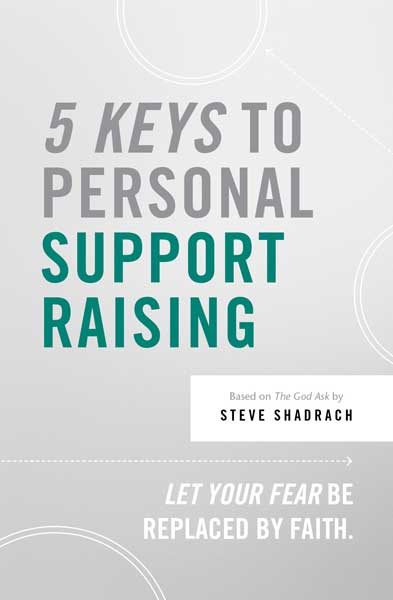
In 1 Corinthians 11:1 Paul says, “Follow my example, as I follow the example of Christ (NIV).” It is interesting that Paul does not say, “Follow Christ’s example, as I follow the example of Christ.” I believe what Paul is trying to convey in this passage is the principle of mentorship in our walk with God.
In whatever skill we are trying to develop, we all need a mentor or a coach to get better. Even the most highly accomplished, professional athletes still need a coach. How much more important is a good coach when it comes to raising support, so that you can serve where God has called you?
I recommend you look for someone with five main attributes when trying to find the best donor coach possible.
- Someone with experience.
Finding a coach who has had many years of support raising experience is just the wise thing to do. A veteran’s advice given from lots of time building relationships with donors and churches will be invaluable to you. Try to listen to an experienced person without quickly dismissing their advice as being “old fashioned.” The core fundamentals of support raising success never change.
Heads up! Some long-time ministry workers are still riding the coattails of their own hard work from previous years of donor care, and now that they are fully funded, it just comes naturally to them. While being in this “sweet spot” of support raising is nice, veterans may cavalierly offer the advice of “just get to work” while forgetting some of the nuances that are necessary for success. Be aware that full support may be coming in easily for the veteran due to the faithfulness of their donors, rather than the veteran’s skillful donor care.
- Someone who has a proven track record.
Getting a coach who is successful at support raising may seem obvious, but there will be many opinions flying at you from all directions. Even from respectable veteran colleagues who struggle to get their own full support. Choose a person to coach you who has a proven track record and maintains consistent monthly and annual support.
Heads up! Just because someone is an amazing ministry worker, and spiritually mature, does not mean they should be giving advice as a support raising coach. Make sure the coach you choose generates full support themselves.
- Someone who will skillfully work within your personality traits and giftings.
Some coaches think support raising has a one-size-fits-all approach. Not true. There is the thought out there that you have to use “extroverted” tactics to be successful at support raising. However, both introverts and extroverts with various skill sets can be successful at raising support. It’s one thing to be challenged by a coach to step outside of your comfort zone, it’s quite another to be pressured to do something that is outside of your personality. Find a coach that can adjust their approach based on your personality.
Heads up! Some coaches will have a bold, cut-to-the-chase approach that has worked for them and their personality, while other coaches will have a softer approach where they shower donors with unnecessary gifts, make hinty asks (if an ask is made at all), and do not get the best results. Watch out for both extremes.
- Someone who has a positive outlook.
Find a coach that is genuinely strong in faith and has a positive outlook when it comes to support raising. A good coach finds joy and amazement in how God provides for us, cares for us, grows our faith, and speaks to us through our support raising. A good coach will teach you to wait on God with anticipation, and never speaks negatively about raising support.
Heads up! Coaches who think that support raising is a necessary evil, who believe that support raising is something you stop ministry to do, and who say things like, “Wouldn’t it be nice if someone raised support for you, so that you could just focus on your ministry?”, are all examples of a coach with a negative attitude and questionable support raising theology.
- Someone who understands that both faith and works are necessary.
Find a coach who, like Nehemiah, understands that both faith and works are required to get the job done. Look for a person with the mantra, “Pray like you don’t work, and work like you don’t pray.” A coach who knows the rhythm between faith and works is the one you want.
Heads up! A “super-spiritual” coach who is all about “faith” alone, may keep you from the hard work of support raising, leaving you feeling bewildered about how God provides. A coach with a pushy approach, who is only focused on formulas, marketing, and sales tactics, may remove the warmth and joy that is needed for good donor care.
When looking for a coach, keep your eyes wide open using the recommendations above, and then choose wisely! Your future support raising success may depend on getting the right coach who will walk alongside you.

